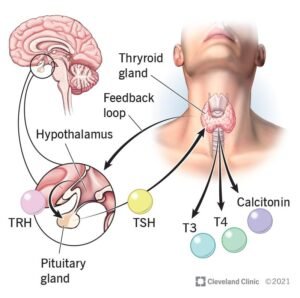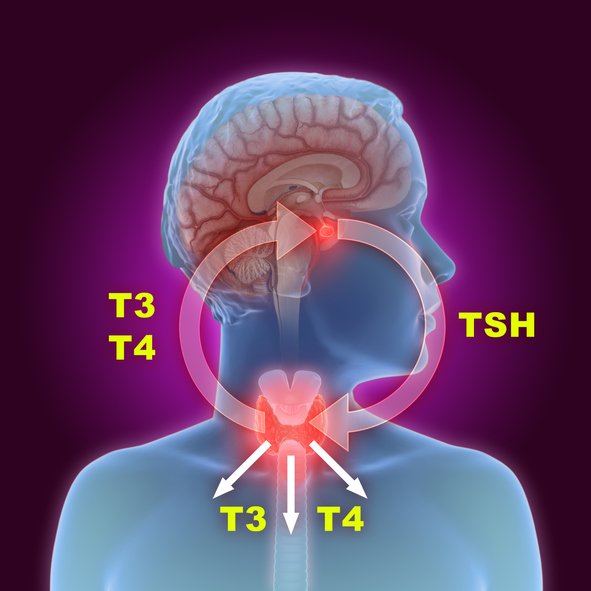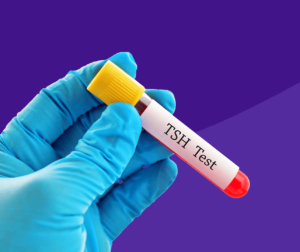TSH: Function and Diagnostic Insights
Thyroid-stimulating hormone (TSH), also known as thyrotropin, is a pivotal hormone produced by the pituitary gland. Located at the base of the brain. TSH plays an essential role in the regulation of the thyroid gland. Which is responsible for producing hormones that influence various metabolic processes within the body. By stimulating the thyroid gland, TSH controls the secretion of two primary hormones: thyroxine (T4) and triiodothyronine (T3). These hormones are crucial for maintaining the body’s metabolism, energy levels, and overall growth and development.
The production of TSH is governed by the hypothalamus, which releases thyrotropin-releasing hormone (TRH) in response to low levels of thyroid hormones. This hormonal feedback loop ensures that the thyroid gland functions optimally, promoting hormonal balance that is vital for maintaining health. When TSH levels are within a normal range, individuals typically experience regulated metabolism and stable energy levels, contributing positively to mental and physical well-being. Moreover, adequate levels of TSH are particularly significant during periods of growth. Such as childhood and adolescence. As thyroid hormones play a critical role in development. Insufficient production of TSH can lead to hypothyroidism, a condition characterized by fatigue, weight gain, and depression, while excessive TSH levels may indicate hyperthyroidism, which can result in weight loss, anxiety, and cardiovascular issues. Therefore, understanding the role of TSH in the body is crucial for recognizing potential hormonal imbalances and their associated health implications.
The Mechanism of TSH Function
Thyroid Stimulating Hormone (TSH) plays a crucial role in regulating the function of the thyroid gland. Which is responsible for producing essential hormones that govern metabolic processes throughout the body. Produced by the pituitary gland, TSH directly stimulates the thyroid to synthesize and release two key hormones: thyroxine (T4) and triiodothyronine (T3). The interaction between TSH and the thyroid gland initiates a cascade of physiological responses that are vital for maintaining homeostasis. The functioning of TSH is intricately connected to a feedback loop involving T4 and T3. When the levels of these hormones in the bloodstream are adequate, they signal the pituitary gland to reduce TSH production. Conversely, when T4 and T3 levels fall below normal, the inhibition is lifted, prompting the pituitary to secrete more TSH. This feedback mechanism ensures that hormone levels remain balanced, demonstrating the delicate interplay between the thyroid and the pituitary gland. Low TSH levels may indicate an overactive thyroid, a condition known as hyperthyroidism, which can lead to symptoms such as weight loss, increased heart rate, and anxiety. In contrast, high TSH levels may signify an underactive thyroid, or hypothyroidism, characterized by fatigue, weight gain, and depression. The body’s physiological responses to these extremes highlight the importance of maintaining optimal TSH levels for overall health. Understanding the mechanism of TSH function provides insight into various thyroid-related conditions. The importance of monitoring TSH levels as part of a comprehensive approach to health management. By assessing TSH, healthcare providers can gain vital information about thyroid status, paving the way for appropriate diagnostic and therapeutic strategies.
Diagnostic Tests : Methods and Interpretation
Thyroid-stimulating hormone (TSH) testing is a crucial diagnostic tool utilized in evaluating thyroid function. The most common method for measuring TSH levels is through a simple blood test. Healthcare providers typically recommend this test when a patient exhibits symptoms indicative of a thyroid disorder, such as fatigue, weight fluctuations, or changes in mood. The standard procedure involves drawing a blood sample from the patient, which is then sent to a laboratory for analysis. Results are typically available within a few days.
The normal range for TSH levels generally lies between 0.4 to 4.0 mIU/L, although variations can occur based on individual factors and laboratory standards. Elevated TSH levels may indicate hypothyroidism, a condition where the thyroid gland is underactive, resulting in insufficient hormone production. Conversely, low TSH levels are often associated with hyperthyroidism, where the thyroid is overactive, producing excess hormones. Understanding these results is vital for diagnosing thyroid dysfunction and guiding subsequent treatment plans.
High TSH levels prompt healthcare providers to investigate the underlying causes of hypothyroidism further, which could include autoimmune conditions such as Hashimoto’s thyroiditis, certain medications, or iodine deficiency. Interpretation of low TSH levels often leads to evaluating for hyperthyroid conditions, including Graves’ disease or thyroid nodules. Clinicians must consider these results in conjunction with other thyroid hormone tests, such as free T4 and T3, to obtain a comprehensive view of thyroid health. In summary, TSH testing is a fundamental component of diagnosing thyroid disorders. Understanding the implications of TSH levels plays a significant role in guiding appropriate treatment options, ensuring that patients receive the necessary care based on their unique thyroid health status.
The Clinical Importance of Monitoring TSH Levels
Monitoring Thyroid Stimulating Hormone (TSH) levels is crucial for managing thyroid health effectively. TSH is produced by the pituitary gland and plays a vital role in regulating thyroid function. which in turn influences metabolism, energy levels, and overall wellbeing. Regular testing is important for those diagnosed with thyroid disorders. Such as hypothyroidism or hyperthyroidism, as it allows healthcare providers to tailor treatment plans specifically suited to individual needs.
According to clinical guidelines, individuals with a higher risk of thyroid dysfunction, including those with a family history or pre-existing autoimmune conditions. Should have their TSH levels monitored regularly. Furthermore, people over the age of 60 or those experiencing symptoms such as fatigue, weight changes, or depression may also benefit from screening. Many health organizations recommend that TSH should be assessed at least every one to two years in at-risk populations.
The TSH level not only aids in diagnosing thyroid disorders but is also instrumental in assessing the effectiveness of treatment. For example, in patients undergoing thyroxine therapy for hypothyroidism, consistent monitoring of TSH levels ensures that the dosage remains appropriate. If levels are too high or too low. Adjustments can be made to optimize therapeutic outcomes and minimize potential side effects.
Neglecting to monitor TSH levels could lead to serious health complications, including cardiovascular issues, osteoporosis, and severe fatigue. Additionally, lifestyle factors such as stress, diet, and medications can significantly influence TSH levels. For instance, certain psychotropic medications and supplements may alter your hormonal balance. Maintaining awareness of these factors can empower individuals to manage their health proactively and in collaboration with their healthcare providers. Regular monitoring of TSH levels thus represents an essential aspect of effective thyroid health management.

